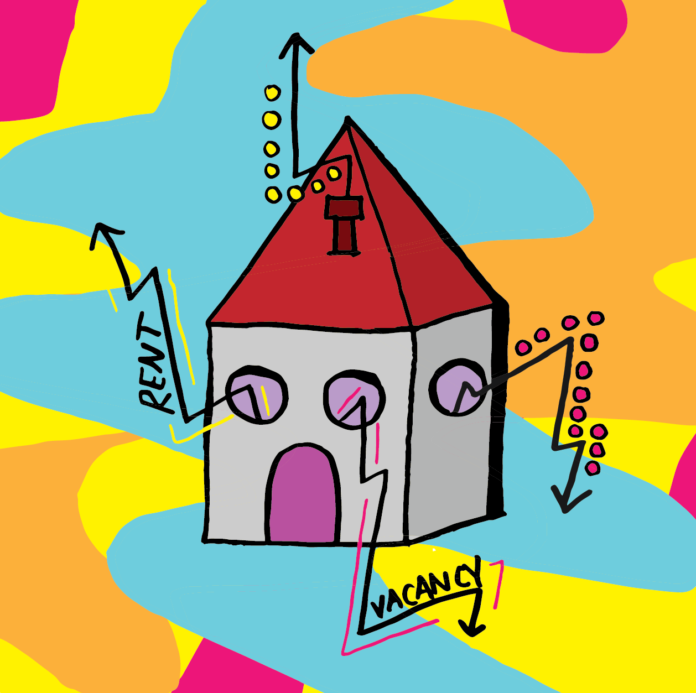Representatives from UC Davis, city council, county board of supervisors hosted a yearly meeting on campus, special focus on student housing efforts
An annual public meeting between county, city and university representatives was hosted at the UC Davis Genome Center Auditorium on Oct. 17, during which officials discussed the measures currently underway to address a shortage of available housing in Davis. University officials delivered a follow-up presentation during the next city council meeting on Oct. 22.
The university was represented by Chancellor Gary May, Vice Chancellor for Finance, Operations and Administration Kelly Ratliff and Associate Chancellor Karl Engelbach, according to the meeting notes. Mayor Brett Lee and Mayor Pro Tempore Gloria Partida, as well as council members Lucas Frerichs, Dan Carson and Will Arnold, represented the city government, while supervisors Dan Saylor and Jim Provenza represented the county.
At the meeting, May delivered a presentation that both highlighted the university’s recent successes and cited efforts currently underway to build new student housing. May cited UC Davis’ recent rankings among other public universities in the U.S. — including placing fifth in the country by the Wall Street Journal/Times Higher Education ranking, fourth by Money Magazine and 11th by US News. He noted that UC Davis continues to rank first in the world for Agriculture and Veterinary Medicine and that UC Davis Medical Center was ranked the number one hospital in Sacramento.
After touching on some of the administration’s efforts to address mental health and food insecurity among students, May moved on to the subject of housing. According to May’s presentation, the university has set the goal of 6,000 new beds by 2025. In early November, the university released a report detailing the progress of each of its new housing developments toward meeting this goal.
Lee, representing the city, presented a table of data on the status of several pending, under-construction and completed housing developments in the city. The table included several student-oriented housing developments that had completed the planning review stage and were pending construction, including Nishi, Lincoln 40 and Davis Live. The pending developments would add 3,348 new beds to student housing. The chart also noted the recently completed Sterling 5th St Apt., slated to provide 540 beds by completion.
Lee also noted other major developments within the city that targeted individuals, families and members of the workforce. In total, completed and pending developments listed on Lee’s chart would add 4,567 new beds of available housing in the city upon completion. Lee said he expects all of the pending construction to be completed between two to five years from now, according to the Davis Enterprise.
“A lot more housing will be hitting the market soon,” Lee said, according to the Enterprise.
Supervisor Don Saylor’s presentation focused mainly on the county’s participation in specific services offered on the UC campus, including CalFresh and mental health resources under the Mental Health Services Act.
He did note several projects that may improve the commute of off-campus students, including an improvement project on I-80 that seeks to reduce traffic congestion through Davis and the launch of the Causeway Connect bus project. This will institute fully electric buses traveling between the UC Davis campus and the Sacramento medical center, with additional limited stops in Davis and Sacramento. The projected is targeted to launch in April 2020.
During the Oct. 22 city council meeting, administrators from Davis delivered a follow-up report on the college’s finances, which paid special attention to how UC Davis plans to address some of the housing pressures posed during the on-campus meeting.
Megan Glide Villasenor, assistant director at UC Davis Shared Services Center, pointed to a goal set by UC President Janet Napolitano’s 2016 Student Housing Initiative which sought to add 14,000 new available beds in student housing across the UC system. Villasenor said that the UC system had exceeded that goal, with a projected 15,161 new beds added system-wide by Fall 2020. UC Davis will have instituted 2,190 of that number, according to Villasenor.
“Davis has actually been an integral part of reaching the target we set for the fall of 2020,” Villasenor said.
After the administrator’s presentation, Lee stressed the importance of continued collaboration between the university and city officials to address housing issues in the city.
“The goal here is to mitigate some of the impacts that the student population has, but we need to be smart about it and work in partnership,” Lee said.
Written by: Tim Lalonde — city@theaggie.org










